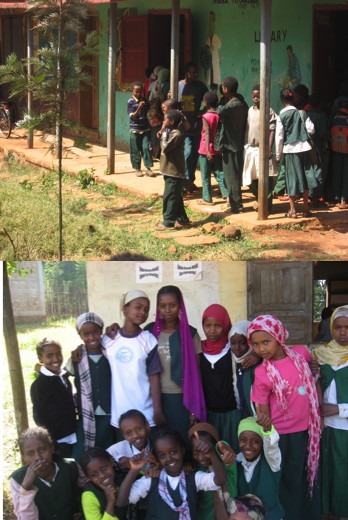
Infections with soil-transmitted helminths (STH) occurs throughout the developing world and remains a major public health problem in the poorest communities with enormous consequences on health and development of school-aged and pre-school children. Infection is caused by four main species of worms commonly known as roundworms (Ascaris lumbricoides), whipworms (Trichuris trichiura) and hookworms (Ancylostoma duodenale and Necator americanus). It is estimated that STH affects more than 2 billion people worldwide, and the greatest numbers of infections occur in sub-Saharan Africa, the Americas, China and East Asia. The morbidity caused by these worms is commonly associated with heavy infection intensities. School aged children and pre-school children are the most vulnerable group and they harbour the greatest numbers of intestinal worms. As a result, they experience growth stunting and diminished physical fitness as well as impaired memory and cognition (Crompton and Nesheim, 2002; Stephenson et al., 2000; Bethony et al., 2006). These adverse health consequences combine to impair childhood educational performance and reduce school attendance (Miguel and Kremer, 2004; Hotez et al., 2008).
Today, preventive chemotherapy (PCT) programmes in which single-dose albendazole 400 mg or single-dose mebendazole 500 mg – the drugs of choice for STHs – are administered, is the main strategy for STH control (WHO, 2006) and a scale-up of these large-scale programmes is underway in various parts of Africa, Asia and South-America.
Currently, we are entering a new era of combating STH: the WHO has made a roadmap to guide implementation of the policies and strategies set out in the Global Plan to combat NTD 2008-2015; and more than 70 pharmaceutical companies, governments and global health organisations have committed to support the implementation of this roadmap in the London Declaration on NTD (January 31, 2012) by sustaining or expanding existing drug donation programmes, with the support of the Bill & Melinda Gates Foundation and under the leadership and coordination of WHO.
Publications:
Levecke B., Brooker S.J., Knopp S., Steinmann P., Stothard R.J., Sousa-Figueiredo J.C., Utzinger J., Vercruysse J. Effect of sampling and diagnostic effort on the assessment of schistosomiasis and soil-transmitted helminthiasis and drug efficacy: a meta-analysis of six drug efficacy trials and one epidemiological survey. Parasitology Special Issue (n press)
Kattula D., Ajjampur S.S.R., Minz S., Muliyil J., Levecke B., Kang G., 2014. Risk factors for soil-transmitted helminth among school children south India. Indian Journal of Medical Research 139, 76-82.
Mekonnen Z., Levecke B., Boulet G., Bogers J.P., Vercruysse J., 2013 Efficacy of different albendazole and mebendazole regimens against high-intensity Trichuris trichiura infections in school children, Jimma, Ethiopia. Pathogens and Global Health 107, 207-209.
Montresor A., Levecke B., Albonico A., Verruysse J. (2013). Assessing the efficacy of anthelminthic drugs against schistosomiasis and soil-transmitted helminthiasis. Geneva: World Health Organization; 2013. WHO/HTM/NTD/PCT/2013.4 (No IF available)
Krolewiecki A.J., Lammie P., Jacobson J., Gabrielli A.F., Levecke B., Socias E., Arias L.M., Sosa N., Abraham D., Cimino R., Echazú A., Crudo F., Vercruysse J., Albonico M., 2013. A public health response against Strongyloides stercoralis: time to look at soil-transmitted helminthiasis in full. PLoS Neglected Tropical Diseases 7:e2165.
Mekonnen Z., Meka S., Ayana M., Bogers J., Vercruysse J., Levecke B., 2013. Comparison of individual and pooled stool samples for the assessment of soil-transmitted helminth infection intensity and drug efficacy. PLoS Neglected Tropical Diseases, 7:e2189.
Vercruysse J., Levecke B., Prichard R. Human soil-transmitted helminths: implications of mass drug administration. Current Opinion on Infectious Diseases 25, 703-708
Levecke B., Vercruysse J., 2012. Reply to comment on: The impact of baseline faecal egg counts on the efficacy of single-dose albendazole against Trichuris trichiura. Transactions of the Royal Society of Tropical Medicine and Hygiene 106, 390-392.
Albonico M., Ame S.M., Vercruysse J., Levecke B., 2012. Comparison of Kato-Katz thicksmear and McMaster egg counting method for monitoring drug efficacy against soil-transmitted helminths in school children of Pemba Island, Tanzania. Transactions of the Royal Society of Tropical Medicine and Hygiene 106, 199-201.
Levecke B., Mekonnen Z., Albonico M., Vercruysse J., 2011 The impact of baseline FEC on the efficacy of a single-dose albendazole against Trichuris trichiura. Transactions of the Royal Society of Tropical Medicine and Hygiene 106, 128-130.
Levecke B., Speybroeck N., Dobson R., Vercruysse J., Charlier J., 2011. Novel insights in the fecal egg count reduction test for monitoring drug efficacy against soil-transmitted helminths in large-scale treatment programs. PLoS Neglected Tropical Diseases 5:21427.
Vercruysse J., Albonico M., Behnke J.M., Kotze A.C., Prichard R.K., McCarthy J.S., Montresor A., Levecke B., 2011. Is anthelmintic resistance a concern for the control of human soil-transmitted helminths? International Journal of Parasitology: Drugs and Drug Resistance 1, 14–27.
Levecke B., Behnke J.M., Ajjampur S.S.R., Albonico M., Ame S.M., Charlier J., Geiger S., Hoa N.T.V., Kotze A.C., McCarthy J., Montresor A., Periago M.V., Roy S., Sumo L., Tchuem Tchuenté L.-A., Thach D.T.C., Vercruysse J., 2011. A multinational comparison of McMaster and Kato-Katz for the detection and quantification of soil-transmitted helminth Infections in public health. PLoS Neglected Tropical Diseases. 5: e1201 (IF = 4.693).
Vercruysse J., Behnke J.M., Albonico M., Ame S.M., Angebault C., Bethony J.M., Engels D., Guillard B., Hoa N.T.V., Kang G., Kattula D., Kotze A.C., McCarthy J.S., Mekonnen Z., Montresor A., Periago M.V., Sumo L., Tchuem Tchuenté L.-A., Thach D.T.C., Zeynudin A., Levecke B., 2011. A multinational trial of the efficacy of albendazole against soil-transmitted helminth infections in children. PLoS Neglected Tropical Diseases 5: e948 (IF = 4.693).